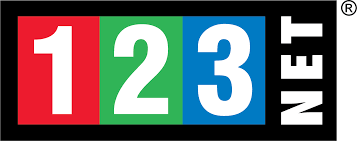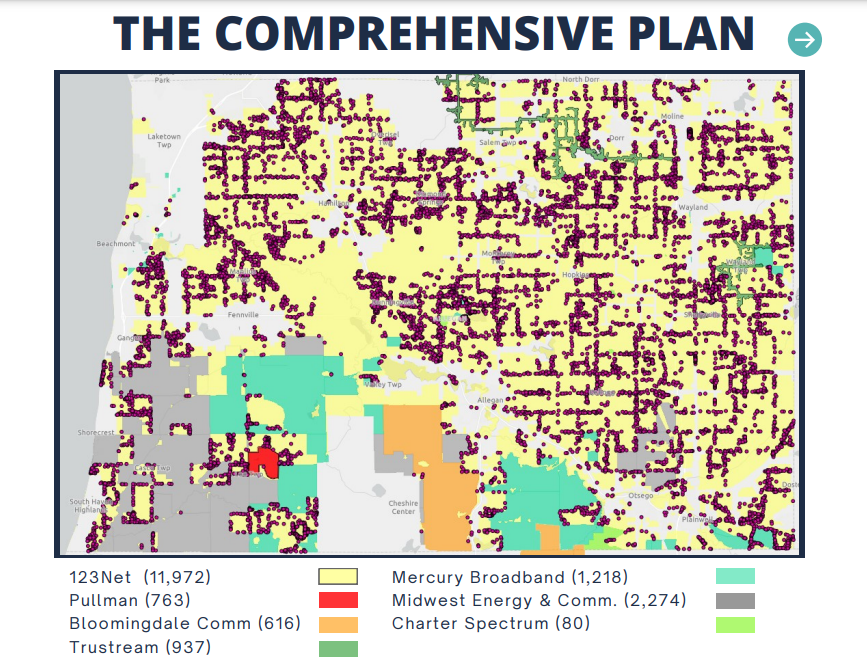
Allegan County, Michigan will soon receive a $30 million state grant to finalize the deployment of a new open access, carrier-neutral fiber network. The end result will bring overdue competition – and affordable multi-gigabit fiber access – to long neglected communities by 2025.
The $30 million award is part of Michigan’s $238 million Realizing Opportunity with Broadband Infrastructure Networks (ROBIN) grant program, made possible by 2021’s American Rescue Plan Act (ARPA) and the resulting Capital Projects Fund.
123NET was chosen by Allegan County in late 2021 to help spearhead the Allegan County Broadband Project. The public-private partnership will bring access to more than 10,000 Allegan County residents either underserved or completely unserved by regional telecom giants, spread out across 1,000 square miles.
123NET and Allegan County had already committed to contributing $17.5 million for the construction of the network, with the county’s share coming from earlier ARPA awards.

"We are pleased to be selected as a recipient of the Michigan ROBIN Grant Funding. This recognition validates the hard work and dedication that both we and Allegan County have put into this Project,” Dan Irvin, CEO of 123NET said of the award. “We look forward to partnering with additional communities throughout Michigan in a combined effort to make this state the best connected on the planet."
The initial deployment will involve the stringing of more than 1,100 miles of high-capacity fiber to pass 10,000 premises. Construction is scheduled to begin in August and take roughly two years to complete, project officials state. The resulting network is expected to deliver speeds upwards of ten gigabits per second (Gbps), with final pricing yet to be determined.
Open Access, Greater Competition Longer Term
The choice to make the network open access should dramatically improve the longer-term benefits seen by locals, project leaders say. Numerous studies have shown that open access fiber networks–which allow numerous ISPs to compete in layers over a shared central infrastructure–routinely result in better service and lower prices.
In some open access deployments, such as in Ammon, Idaho, users ultimately have the choice of switching between numerous ISPs with just a few clicks on a web portal – though Allegan project leaders noted it could be some time before the network sees multiple competitors.
“123NET proposed an open access network,” Allegan County Broadband Project Manager Jill Dunham told ILSR. “I think initially, there will not be enough customers to attract a second ISP to engage in this market. However, fiber has a fifty to eighty year life. We felt there was value in partnering with a vendor that has a collaborative and cooperative approach.”
123NET has also partnered with other underserved Michigan markets like Detroit, where digital redlining by AT&T has long left local residents on the wrong side of the digital divide. Those deployments provide fiber speeds up to 10 Gigabits per second (Gbps) without usage caps.
Allegan County’s open access partnership with 123NET is part of a broader county plan to shore up access in cooperation with several local broadband providers, many of which are expanding access on the backs of previous programs like the Rural Digital Opportunity Fund (RDOF) and the USDA’s ReConnect program.

Dunham told ILSR that Midwest Energy & Communications and Charter Spectrum are currently using RDOF money to expand access to 3,572 unserved county residents. Several other providers, including Bloomingdale Communications, Great Lakes Energy Truestream, and AT&T, are leaning on other programs to deliver access to another 2,316 locations.
“Very few if any counties in Michigan have a full-time dedicated Project Manager handling broadband expansion,” Durham said. “Kudos to our County Commissioners for funding a resource to advocate for our residents.”
The county hopes that any outstanding unserved and underserved locations will be served courtesy of Broadband Equity And Deployment (BEAD) grants made possible by the Infrastructure Investment and Jobs Act.
As the project advances, the county is urging residents to visit the Allegan County website to obtain project updates and confirm the accuracy of address information.
“No data is 100% accurate and I want to ensure no one is overlooked,” Durham said.
Heavily Monopolized, Widely Underserved, Freshly Financed
According to the latest updates to the state of Michigan’s broadband deployment map, nearly half a million Michigan homes lack access to any broadband connectivity whatsoever. 1.24 million Michigan households (roughly 31.5 percent of state residents) lack access to a permanent connection, and may rely in full or in part on expensive wireless access.
State data suggests that Michigan has the twentieth lowest broadband adoption rate in the nation, which is usually the result of access affordability issues and an overall lack of meaningful broadband competition. The state is also ranked twenty-eighth when it comes to the percentage of residents that have access to 100 Mbps connections.

The state’s existing broadband market is dominated by Comcast and AT&T, whose duopoly has resulted in patchy access, high costs, and substandard customer service.
Some Michigan residents have been forced to build their own Internet service providers from scratch after incumbents refused to serve them. Such as in Holland, Michigan, where residents voted last year to build a city-owned fiber network to finally ensure access to affordable broadband at gigabit speeds. Voters approved the project despite Comcast having spent $100,000 on mailers, radio ads, polling, and consultants to dissuade voters from approving the financing of the project.
In March of 2022, the Michigan legislature leveraged ARPA funding to pass the Building Michigan Together Plan (Senate Bill 565): a $4.6 billion bipartisan investment into Michigan state’s water systems, housing, roads, and parks. Of that total, $238 million was set aside to bolster access to broadband via the ROBIN grant program.
Including Allegan County’s $30 million grant award, the ROBIN program is moving forward awarding grants to 24 projects from 11 applicants. The potential winners are now entering a 45-day comment and objection period “where objections can be made to ensure grant funds do not overlap existing or planned service areas or areas funded by other state or federal programs.” Awards are to be finalized in August.
Between the $265 million in funds requested and the $310 million in matching funds, the program is expected to be the catalyst for more than $575 million in broadband investments, bringing access to 98,808 Michigan homes, 7,085 businesses, and 21 anchor institutions.
The state also received $22.5 million in broadband subsidies via the USDA’s ReConnect program, and last week was awarded over $1.5 billion in BEAD grants to expand broadband access to more than 200,000 Michigan residents.
“Access to high-speed Internet means access to jobs, education, and healthcare,” Zachary Kolodin, Michigan’s Chief Infrastructure Office and Director of the Michigan Infrastructure Office said of the BEAD awards. "The federal funding we've received from the BEAD program will allow us to connect more than 200,000 underserved households to high-quality, high-speed internet, ensuring that every home in all of Michigan's 83 counties has broadband access."
Header image of downtown Allegan aerial photo courtesy of the City of Allegan
Inline image of Welcome to Holland sign courtesy of Wikimedia Commons, Attribution-ShareAlike 3.0 Unported (CC BY-SA 3.0)







